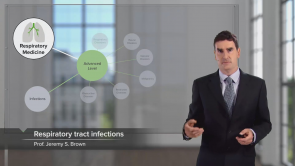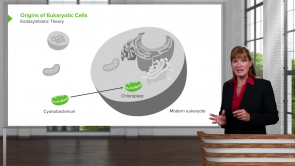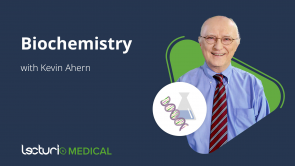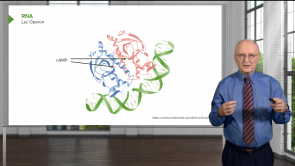Hormonal Control

About the Lecture
The lecture Hormonal Control by Kevin Ahern, PhD is from the course Metabolic Control.
Included Quiz Questions
Which of the following statements about fructose 2,6-bisphosphate (F2,6BP) is NOT true?
- It is made by PFK1.
- It is broken down by FBPase-2.
- Insulin stimulates its production.
- It favors glycolysis by activating phosphofructokinase (PFK).
Which of the following hormones do NOT play a role in maintaining the blood glucose levels in the body of multicellular organisms?
- Androgen
- Inhibin
- Glucagon
- Insulin
- Epinephrine
Which of the following hormones counteracts the effect of epinephrine?
- Insulin
- Androgen
- Inhibin
- Glucagon
- Hepcidin
Which of the following is true of fructose-2,6-bisphosphate?
- It allosterically affects the activities of phosphofructokinase-1 (PFK-1) and fructose-1,6-bisphosphatase enzymes.
- It allosterically affects the activities of the adenyl cyclase enzyme.
- It allosterically affects the function of insulin hormones.
- It stimulates the production of glucagon and epinephrine hormones.
- It stimulates the production of insulin by the pancreas.
Which of the following statements is NOT true regarding the hormonal regulation of glucose in the body?
- Insulin and epinephrine hormones directly bind to the catalytic sites of the FBPase enzyme and regulate the simultaneous working of gluconeogenesis and glycolysis.
- The enzyme protein kinase A gets activated by the hormones epinephrine and glucagon.
- In response to the high levels of insulin, the G-protein gets inactivated, and then the insulin-stimulated phosphatase enzyme converts FBPase to PFK-2 form and starts the glycolysis pathway.
- The activated FBPase-2 activates gluconeogenesis by synthesis of fructose-6-phosphate from fructose-2,6-bisphosphate.
- The activated protein kinase A enzyme causes the phosphorylation of PFK-2 and activates the FBPase-2 activity.
Which of the following is NOT an endocrine gland?
- Brunner's glands
- Pituitary gland
- Thyroid gland
- Adrenal glands
- Pineal gland
These courses may be of interest to you
Customer reviews
5,0 of 5 stars
| 5 Stars |
|
5 |
| 4 Stars |
|
0 |
| 3 Stars |
|
0 |
| 2 Stars |
|
0 |
| 1 Star |
|
0 |






